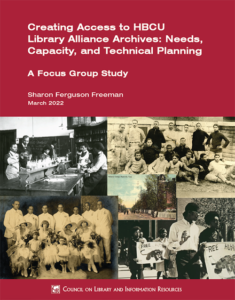April 11, 2022— A new report from CLIR and the HBCU Library Alliance explores the common barriers and shared visions for creating access to archival collections held by libraries at Historically Black Colleges and Universities (HBCUs). Chronicling nearly 300 years of the lived experiences and legacies of African Americans, these materials are vital to enriching our understanding of the achievements, influence, and global impact of African American people and communities. Many of these collections, however, remain inaccessible because of constraints in staffing, space, collections, equipment, and other resources.
Creating Access to HBCU Library Alliance Archives: Needs, Capacity, and Technical Planning is one of few reports that document the needs of HBCU libraries as they relate to archives and special collections. It is based on a series of online focus groups that author Sharon Ferguson Freeman facilitated with HBCU library directors and deans in 2021. The study provides insight into the significance of special and archival collections for HBCU libraries and their communities; the management and capacity of archives and special collections; and these libraries’ values, priorities, needs, and aspirations. The findings also reveal information related to the impact of the COVID-19 pandemic on HBCUs and broader topics of significance that were not anticipated when the project began.
 The collections described in the report encompass materials relating to organizational affiliations with churches, African American history, the civil rights movement, and institutional histories. Images from these collections are featured throughout the report.
The collections described in the report encompass materials relating to organizational affiliations with churches, African American history, the civil rights movement, and institutional histories. Images from these collections are featured throughout the report.
The desire for additional staff, adequate space, digitization of collections, and expansion of collections emerged as key priorities among the focus group participants. Participants also expressed the wish for an endowment to be used exclusively to support archives and special collections.
“The collections within HBCU libraries, the stories they uncover, the voices that must be amplified are more important now than ever before,” said HBCU executive director Sandra Phoenix. Our partnership with CLIR aims to foster awareness and access to diverse historical records that shaped American history, thus informing dialog to promote the common good. This work is a critical step to ensuring the preservation and accessibility of the authentic voice of African American history in the United States. It is imperative that history accurately reflects and acknowledges the innumerable contributions of generations of African Americans to the economic, social, and cultural development of our nation.”
The project grew out of a partnership formalized in 2019 between the HBCU Library Alliance and CLIR, and a 2020 Mellon Foundation grant for a study to inform a sustainable shared infrastructure for creating access to HBCU Library Alliance members’ archival collections.
“History is a dynamic inheritance, requiring diligent stewardship and rigorous assessment,” said CLIR president Charles Henry. “Our partnership with the HBCU Library Alliance and its archives seeks to assure that our national historical narrative is true, respectful, and multidimensional, to include voices that have been marginalized or suppressed, providing a more authentic understanding of our place and our selves.”
Creating Access to HBCU Library Alliance Archives: Needs, Capacity, and Technical Planning is available as a freely downloadable pdf at https://www.clir.org/wp-content/uploads/sites/6/2022/04/Creating-Access-to-HBCU-Library-Alliance-Archives.pdf.
The HBCU Library Alliance is a consortium that supports the collaboration of information professionals dedicated to providing an array of resources to strengthen Historically Black Colleges and Universities (HBCUs) and their constituents. As the voice of advocacy for member institutions, the HBCU Library Alliance is uniquely designed to transform and strengthen its membership by developing library leaders, helping to curate, preserve and disseminate relevant digital collections, and engaging in strategic planning for the future.
CLIR is an independent, nonprofit organization that forges strategies to enhance research, teaching, and learning environments in collaboration with libraries, cultural institutions, and communities of higher learning. In pursuing its mission, CLIR is committed to capitalizing on strategic opportunities, building trust, and cultivating effective leadership.